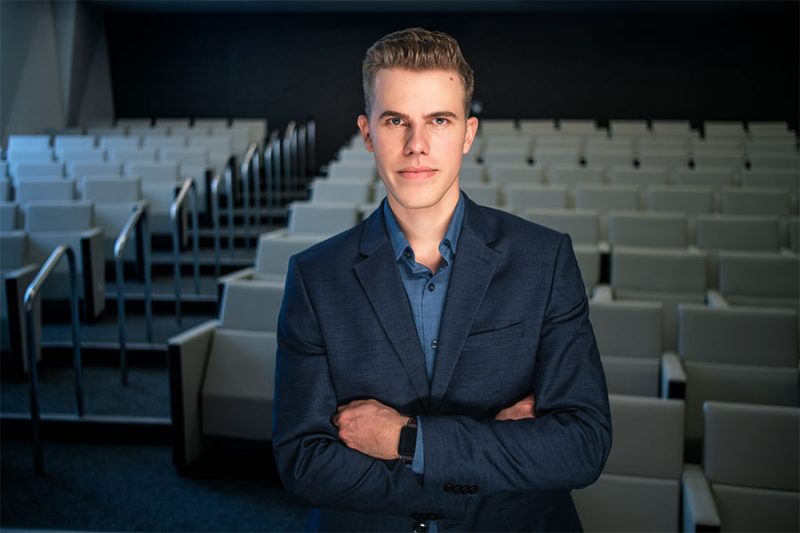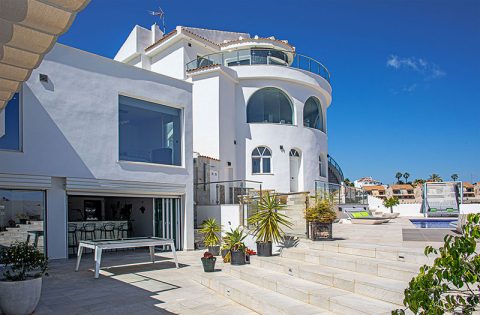Zeal Reserve Capital Partners prides itself on being a transparent cryptocurrency fund built with a network of experienced service providers. The company is headed by industry professionals, giving clients asset management in the ever-changing cryptocurrency market.
Co-founded by company CEO Sam Borghese, Zeal Reserve focuses on providing a human touch to the digital world. Clients are provided active management without the costly management fees other firms take from customers.
Borghese co-founded Zeal Reserve in 2021 and in a short time period, has helped grow the company into an expert on crypto-asset fund management. As QuantLab Director at UCLA, Borghese has years of experience in math and modeling, two of his passions. His expertise in the areas has led Zeal Reserve to be a rising star in the crypto-asset fund sector.
Sam, can you start off by telling us about Zeal Reserve and what the company does?
Zeal Reserve is a long/short crypto-asset hedge fund that algorithmically trades Bitcoin and other large-cap cryptocurrencies. Our goal is to create a vehicle that captures the high returns of the blockchain and crypto space while attempting to limit drawdowns and volatility – what we believe to be the two most significant deterring factors for investors. Seen through our backtests and first few months live, Zeal Reserve has demonstrated to be both uncorrelated to Bitcoin and traditional equities.
Can you explain how Zeal Reserve makes crypto an attainable, reliable, and sustainable investment for your clients?
Zeal removes the difficulty with purchasing and storing digital assets by having a typical hedge fund structure, where investors can buy and track their investment with Zeal using our portal the same way, or more easily than they do with other hedge funds, making crypto exposure as easy as buying equities.
Reliability is the market gap we’re trying to fill – that’s another of Zeal’s primary objectives. Historically, crypto sees 90% drawdowns. Zeal works to bring forth a more confident investment in crypto. When the market is moving upwards, Zeal is long; when the market is falling, Zeal shorts. This strategy attempts to create a fund that is uncorrelated to the market cycle, an investment less dependent on market timing..
In addition, we have a dedicated public-facing team who work to assume top-quality IR. We partner with renowned quants who strive to make our algorithms more efficient and robust. As this ever-changing market develops, we’ll be right there maintaining a product that will endure.
Can you explain how the company “manages the volatility” of crypto?
Zeal utilizes a variety of tech indicators to hold positions only when we can have a high conviction of directional movements with an informational advantage. Of course, these predictions are backed by sentiment and fundamental indicators. Diversifying across low correlated or negatively correlated coins helps to maximize our exposure across the asset class. Our target is to capture the upside of the coins in our portfolio while significantly flattening the volatility to a third or less of those of the largest cryptocurrencies.
Borghese stresses that cryptocurrency continues to be big news in the media. The big difference with crypto today and five years ago are the type of stories that are being written and featured on digital currencies. Positivity has grown amongst media outlets and it is delivering more excitement to the world of cryptocurrency.
Crypto doesn’t seem to make the headlines it did around five years ago. Has it become a part of everyday life, or is it a fad that has passed?
I feel like crypto is always in the headlines, but the types of stories have changed vastly. The headlines I remember seeing five years ago were “all cryptocurrencies are going to zero.” The headlines that get the most attention are typically anti-crypto headlines that have fleeting value nowadays. I think most people see now that cryptocurrency is here to stay, as the Fed and other countries’ governments scramble to get on the blockchain before they are outgrown. I believe that the Fed is afraid, and they’re trying to push as much fear, uncertainty, and doubt about other coins as they can, while they rush to mint a digital token of their own.
Today the headlines are more commonly about mass adoption by tech companies like PayPal and Square, adoption of the currency by governments like Panama and El Salvador, and of course, the largest private banks like JP Morgan and Goldman Sachs offering crypto investments to their high-net worth customers. This validation will bring trillions of new dollars into the space, so I believe it is a very exciting time to be working in the crypto hedge fund space.
Sam, you are currently a Professor of Quantitative Economics at UCLA. How did you get involved in investment banking and the financial sector?
I’ve always been interested in the math behind financial markets. My first true passions are math modeling and statistics. Applying this to the markets in 2020, I was able to generate substantial returns – over 500% – using systematic options trading.. After achieving my own personal success, and with the push my long-time friend/serial entrepreneur, Ace, we decided to bring our skills to the crypto hedge fund space.. Once the two of us came together with our third partner Andrew and his experience in traditional finance, the trifecta was complete.
My time and work as a professor feed into what I do at Zeal directly. At UCLA, I teach highly applied courses in data management and financial forecasting. All of the skills covered in the courses I designed are directly applicable to the development and educational sides of Zeal Reserve. Some of the topics I teach include algorithmic trading, machine learning, cloud deployment, web scraping, and data mining.
What is the future of crypto, in your opinion?
In the same way that horse-and-buggy companies were forced to develop cars, banks and we believe traditional financial services will have to embrace crypto, or they will be left behind. The nearest term application of cryptocurrencies is in DeFi (Decentralized Finance) now through the use of smart contracts. One prominent example of smart contracts is lending. A person’s dollars or gold can be digitized and lent out. Then the high rate of interest charged to borrowers gets paid out directly to the asset owner. Soon there will be no need for financial intermediaries to take their brokerage fees. We see now these decentralized lending platforms paying out 10% APR monthly, a far cry from the 0.1% national savings rate.
Furthermore, it’s only a matter of time before crypto ETFs are approved. Some have been proposed by the largest investment companies, like BlackRock, Pantera, and many others. Once an ETF is approved, retirement funds, endowments, and older, more conservative investors will have comfortable and easy access to adopt crypto as a small percentage of their overall portfolios.
Cryptocurrency is a hot property for investors, especially Bitcoin. The amount of money available in the crypto sector is unbelievable. Bitcoin remains the leader in cryptocurrency and remains the best returning asset.
What makes crypto so attractive to investors right now?
Bitcoin is a hot asset, but nearly all of the activity so far is retail. There’s currently less than $100 billion of institutional investment in crypto right now. At the time of this interview, the total crypto market cap is hovering above $2 trillion. Over the next 2-5 years, crypto will see an unimaginable inflow of retail, institutional, and public capital. There is already incredible demand for crypto, and I see this tidal wave of adoption as an inevitable movement in the industry.
It’s been far and above the best returning asset class year over year since its inception more than a decade ago – 200% APR for some of the largest coins and 10,000% plus for some of the smaller ones. Some people buy crypto as an inflation edge, especially now when we see the central market flooding the market with new dollars.
Bitcoin was created to combat the central bank doing exactly this – flooding the market with newly printed dollars through quantitative easing – after the stock market crash of ’08. Bitcoin’s design is to be an asset immune to inflation or dilution, as it has a total fixed supply, with less and less being produced each year. 2008 pales in comparison to the level of quantitative easing that has just been performed this year. We’re going to see a huge devaluing of the US dollar and other fiat currencies in the times ahead, which will, in turn, lead to more people seeking the solution provided by bitcoin.
The company launched in July 2021. How difficult was it to establish a new company during the COVID-19 pandemic?
This is another great question. The past year has brought more than its fair share of unique challenges and opportunities for businesses in all sectors, and clearly, it’s not over yet. Personally, our team is incredibly lucky in that we’ve not been affected by COVID-19 in the way that so many others have. From the perspective of the business, coronavirus has meant longer lead times – incorporation processes that might normally take a few weeks can take a month or more – as well as increased costs on all kinds of things due to shortages and backlogs. On the other hand, some things have been much easier. By this point, most people are very accustomed to meeting virtually, which has allowed us to network and form partnerships more efficiently than if we were meeting everyone in person.
One of the major issues cryptocurrency experiences is volatility. The COVID-19 pandemic hasn’t stopped that volatility as the markets have fluctuated.
Has the crypto market experienced more or less volatility during the COVID-19 pandemic?
Absolutely more. At the start of the pandemic, there was a liquidity crisis. Times of low liquidity usually create high volatility. Then in May, there was a substantial event known as the BTC halving. The fee paid out to the validators of the BTC system was cut in half. Historically these events are seen by a significant rise in volatility, typically leading to a 1000% or more rise in the price. After that, fears of prolonged lockdowns led to higher volatility overall, however accounting for market cycles and black swan events, the volatility of Bitcoin has been in a steady downward trend since its inception.
What can clients expect from Zeal Reserve in the next few months? Are there plans for more products in the future?
There are plans for many more products in the future. Around the bottom of the next bear market, we are planning to launch a data-driven discretionary fund that invests in emerging DeFi projects. This fund, currently in incubation, will be high risk but have the potential to satisfy investors with a higher appetite for risk and yield. Leaning on the real estate investment experience of my partner Andrew, we see huge improvements that can be made to real estate funds through tokenization. Most excitingly, currently in development is a mid-cap tracker similar to the S&P midcap 400 but with a proprietary rebalancing strategy that allows for investors to get substantial exposure to fast-growing cryptocurrencies. We also have plans for an arbitrage fund. Currently, our main focus is on the continued launch and support of our flagship fund, as this is our best opportunity right now. But rest assured, there’s much more to come.
Sam, what is a day in your life like?
I wake up at 6 am. I find that I’m most creative in the early part of the morning, so I’m conscious not to use my phone or my computer for the first few hours after waking up. I cook breakfast, a veggie omelet, and work out, either yoga and lifting weights outside or swimming laps in the pool in the living room. Once my mind has been sharpened in this way, I read the news, check the markets, and my calendar for the day. Then I code (R&D for Zeal) until about 9 am. I typically have meetings and lectures until around 1 in the afternoon. Then, I have a lunch meeting, typically with quants or new clients. My afternoons are split between Zeal Reserve, research meetings with the UCLA QuantLab team, and working on applied projects – leading teams of graduate students to provide deliverables to private companies in the tech and fintech space. Our Zeal team meetings are centered on assessing long- and short-range goals and recapping stuff from the day. Most nights, I’m in bed with a book by 10 pm or 11 pm. I get through about a book a week. The last book I read was The Black Swan by Nassim Taleb.
What is something most people don’t know about you?
I think some people assume that finance guys are just about numbers and graphs. My favorite time spent is actually outside in nature, mountain biking, or meditating. Indoors, my time spent not working, and one of my favorite hobbies is sewing. I design and make custom clothes and shoes for myself and my friends.
What makes you smile?
I get a strong charge from being around other people. My friends would tell you that it’s pretty easy to make me smile. I get lighter and brighter when I’m around my friends. They make me laugh, they make me think, and they remind me of the good in life.
What scares you?
I have a fear of not evolving. I’m not moving forward if I’m not challenging myself, and if I’m not moving forward, I feel uncomfortable. It gives me a lot of anxiety. I need to be challenged and progress myself to new levels all the time.
If you had the power to change just one thing in the world what would it be?
I would get drinking water for everybody. Maybe it’s not the most revolutionary thing, but it’s one of the most fundamental. It’s not at the forefront of the news, but it’s one of the most basic human rights that should be addressed. It’s a starting place before we can address higher issues.
In just a short time Borghese has grown Zeal Reserve into a strong performing firm capable of helping investors in the cryptocurrency sector. The potential of cryptocurrency has grown substantially over the past few years. Still, many people are put off from diving into digital currency. Cryptocurrency’s volatility keeps individuals from investing. However, Zeal Reserve aims to help clients with their digital currency investments and to reduce the risk.
For more information on Sam Borghese and Zeal Reserve, please visit https://zealreserve.com
Image credit: Ben Brady

Journalist and author. Contributor











